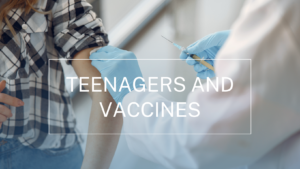TEENAGERS AND VACCINES

Most parents, even brand new ones, expect a lot of vaccines in their children’s first few years of life. There are many diseases that we can protect children from – including whooping cough (pertussis), chicken pox (varicella), and the flu – and most well-child visits include at least one shot. But as our kids grow, the shots are fewer and further between until it seems like they’re only getting a flu vaccine each year (speaking of – now’s the time to get yours!).
However, there are many important vaccines that teenagers should get as well. The Centers for Disease Control (CDC) recommends that children between 11-12 get a Tdap booster and a meningitis vaccine, as well as start the HPV series. When your high schooler is 16 years old, a meningitis booster is needed and many pediatricians also start the Meningitis B vaccine series at that age as well.
What in the world are all these diseases and acronyms? Let’s break it down so that you and your child know what to expect and understand the importance of each of these vaccines.
Tdap vaccine
In the first four years of your child’s life, she likely received 5 DTaP shots that protected her from diphtheria, tetanus and pertussis (whooping cough). However, over time the protection the vaccines provide slowly decreases so when kids are 11 years old we give them a booster, confusingly called Tdap instead of DTaP, which provides further immunity against the same diseases. All of these diseases are caused by bacteria. Diphtheria, which causes a very serious throat infection, and pertussis can both spread person to person through sneezing or coughing; we see pertussis outbreaks even in local schools in DC. Tetanus is caused by a toxin made by bacteria in soil and enters the body through cuts, scrapes or puncture wounds to the skin. It can cause muscle spasms and even breathing problems or paralysis. All good reasons to make sure you are up to date with your booster shot!
Meningococcal Vaccines
Most parents have heard of meningitis or seen the very emotional commercials on TV encouraging them to vaccinate their children. This vaccine protects children from any illness caused by a bacteria called Neisseria meningitides, which can lead to an infection of the fluid and lining around the brain and spinal cord or an infection in the blood. Meningococcal disease passes from person to person through saliva – through things like kissing or sharing a drink – and easily spreads when people live in close quarters such as college dorms. This is why we make sure children are fully vaccinated against this disease before they head off to college. Infections caused by Neisseria meningitides are very serious – the CDC estimates that even with treatment about 10 to 15 out of 100 people will die from it.
The meningitis vaccine that children get at 11 years old protects against four types of the bacteria – A, C, W, and Y. In recent years there have been outbreaks of a fifth kind, Meningitis B, on college campuses with some deaths attributed to it. Therefore, the CDC recommends that teenagers also receive a vaccination against Meningitis B. There are two forms of the vaccine available (one is a three shot series and one is a two shot series) so talk with your pediatrician to see if this is a good choice for your teenager.
HPV Vaccine
Infection with the Human Papilloma Virus (HPV) causes 31,000 cases of cancer in women and men a year according to the CDC. While there are over 150 different strains of HPV, they do not all cause cancer. Thankfully we now have a vaccine that protects against the nine strains of HPV that are most likely to cause cancer.
With the HPV vaccine, starting early is best! Studies have shown that kids 11-15 years who complete the HPV vaccine series show such a good response that only two vaccines total are needed. For older teens who are unvaccinated against HPV, three shots total are needed. Therefore your pediatrician will likely recommend your child receive his or her first HPV vaccine at the 11-year old appointment. Hopefully more cancer preventing vaccines, like the HPV vaccine, are in our future!



